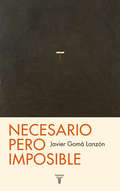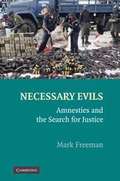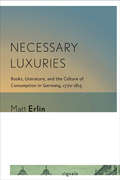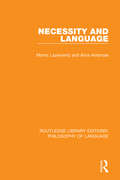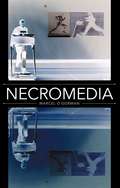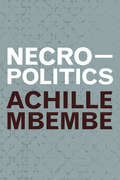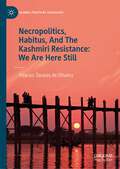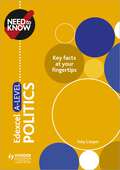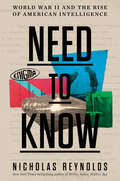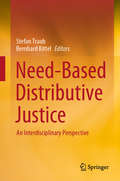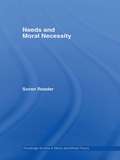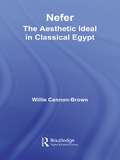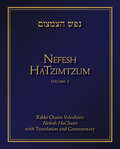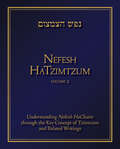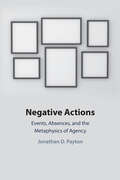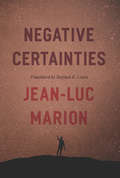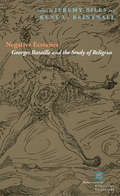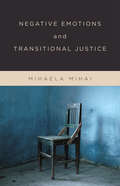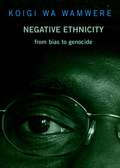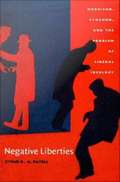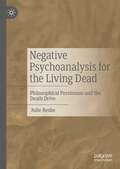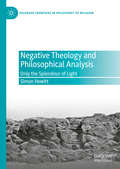- Table View
- List View
Nearly There...: The ups and downs of a frequent latecomer (Everything Bad is Good for You #3)
by Zoë BeatyWe all obsess about worrying less, but worrying can actually be good for you. Similarly we strive to be proactive and fast - but aren't there hidden benefits to procrastinating? The last thing a parent is meant to do is neglect their offspring, but children do amazing things when you just leave them alone. And at work we spend hours frantically brainstorming, but isn't there a benefit to just lazily staring out of the window? In this short piece, Zoe Beaty explores the benefits of being a frequent latecomer, and why not being on time might actually be the best thing for you. EVERYTHING BAD IS GOOD FOR YOU is a new series of short pieces dedicated to the much-maligned personality traits that we should actually be promoting. Just as Susan Cain's QUIET showed that introversion is actually a superpower and Sarah Knight made us all realise that not giving a f**k can actually improve our lives, these surprising and entertaining audiobooks will celebrate our perceived flaws - and show why embracing rather than supressing them can be the difference between failure and success.(P)2019 Hodder & Stoughton Limited
Necesario pero imposible: O ¿qué podemos esperar? (Tetralogía de la ejemplaridad #Volumen)
by Javier Gomá LanzónEste libro recupera para la filosofía la cuestión de la esperanza, y emprende la tarea de hacer creíble una supervivencia más allá de la muerte. En continuidad con Aquiles en el gineceo, que estudia cómo ser individual en este mundo, Necesario pero imposible reflexiona sobre la posibilidad de seguir siéndolo fuera de él. Recupera así la cuestión de la esperanza en una supervivencia personal, abandonada por la filosofía desde Kant. Con el objetivo de «civilizar el infinito», este libro establece las condiciones bajo las cuales sería razonable para un yo moderno -dotado de dignidad infinita pero abocado a la indignidad de la muerte- pensar en esa continuidad post mórtem de lo humano, que no sería nunca una inmortalidad del alma sino una mortalidad prorrogada. Recurre al precedente canónico de esta hipótesis, el profeta de Galilea muerto y resucitado según sus seguidores y a quien éstos recordaron como un modelo de ejemplaridad perfecta. Cada uno de los títulos de esta tetralogía es autónomo y de lectura independiente y al mismo tiempo los cuatro forman parte de un plan unitario en torno a la idea de ejemplaridad: su historia y su teoría general (Imitación y experiencia), su formación subjetiva (Aquiles en el gineceo), su aplicación a la esfera política (Ejemplaridad pública) y su relación con la esperanza (Necesario pero imposible). Esta edición culmina un plan literario-filosófico muy antiguo y largamente cultivado por el autor. Reseñas: «Una extraordinaria reflexión sobre la esperanza.» Pedro G. Cuartango, El Mundo «Un gran ensayo filosófico y un ejercicio literario deslumbrante.» Jon Juaristi, ABC «Javier Gomá medita sobre un tiempo geológico -el filosófico- sin renunciar a observar urgencias del presente. Se apropia de conceptos caídos en desuso y los rellena con savia nueva.» Tereixa Constela, El País «Un hombre cuya formación lo convierte en una espléndida rareza dentro del ámbito del nuevo pensamiento español.» ABC «Javier Gomá se ha convertido con todo merecimiento en una destacada figura del panorama intelectual español.» El Cultural «Un pensador en alza.» El Mundo «El filósofo Javier Gomá es el pensador de moda.» Babelia Reseñas:«Una extraordinaria reflexión sobre la esperanza.»Pedro G. Cuartango, El Mundo «Un gran ensayo filosófico y un ejercicio literario deslumbrante.»Jon Juaristi, ABC «Javier Gomá medita sobre un tiempo geológico -el filosófico- sin renunciar a observar urgencias del presente. Se apropia de conceptos caídos en desuso y los rellena con savia nueva.»Tereixa Constela, El País «Un hombre cuya formación lo convierte en una espléndida rareza dentro del ámbito del nuevo pensamiento español.»ABC «Javier Gomá se ha convertido con todo merecimiento en una destacada figura del panorama intelectual español.»El Cultural «Un pensador en alza.»El Mundo «El filósofo Javier Gomá es el pensador de moda.»Babelia
Necessary Evils
by Mark FreemanThis book is about amnesties for grave international crimes that are adopted by states in moments of transition or social unrest. The subject is naturally controversial, especially in the age of the International Criminal Court. The goal of this book is to reframe and revitalize the global debate on the subject, and to offer an original framework for resolving amnesty dilemmas when they arise. Most existing literature and jurisprudence on amnesties deal with only a small subset of state practice and sidestep the ambiguity of amnesty's position under international law. This book addresses the ambiguity head on and argues that amnesties of the broadest scope are sometimes defensible when adopted as a last recourse in contexts of mass violence. Drawing on an extensive amnesty database, the book offers detailed guidance on how to ensure that amnesties extend the minimum leniency possible, while imposing the maximum accountability on the beneficiaries.
Necessary Luxuries: Books, Literature, and the Culture of Consumption in Germany, 1770–1815
by Matt ErlinThe consumer revolution of the eighteenth century brought new and exotic commodities to Europe from abroad--coffee, tea, spices, and new textiles to name a few. Yet one of the most widely distributed luxury commodities in the period was not new at all, and was produced locally: the book. In Necessary Luxuries, Matt Erlin considers books and the culture around books during this period, focusing specifically on Germany where literature, and the fine arts in general, were the subject of soul-searching debates over the legitimacy of luxury in the modern world.Building on recent work done in the fields of consumption studies as well as the New Economic Criticism, Erlin combines intellectual-historical chapters (on luxury as a concept, luxury editions, and concerns about addictive reading) with contextualized close readings of novels by Campe, Wieland, Moritz, Novalis, and Goethe. As he demonstrates, artists in this period were deeply concerned with their status as luxury producers. The rhetorical strategies they developed to justify their activities evolved in dialogue with more general discussions regarding new forms of discretionary consumption. By emphasizing the fragile legitimacy of the fine arts in the period, Necessary Luxuries offers a fresh perspective on the broader trajectory of German literature in the late eighteenth and early nineteenth century, recasting the entire period in terms of a dynamic unity, rather than simply as a series of literary trends and countertrends.
Necessity and Language
by Morris Lazerowitz Alice AmbroseThe problem of necessity remains one of the central issues in modern philosophy. The authors of this volume, originally published in 1985, developed a new approach to the problem, which focusses on the logical grammar of necessary propositions. This volume gathers their seminal essays on the problem of necessity, together with new material at the original time publication.
Necromedia (Posthumanities #33)
by Marcel O'GormanIn Necromedia, media activist Marcel O&’Gorman takes aim at &“the collusion of death and technology,&” drawing on a broad arsenal that ranges from posthumanist philosophy and social psychology to digital art and handmade &“objects-to-think-with.&” Throughout, O&’Gorman mixes philosophical speculation with artistic creation, personal memoir, and existential dread. He is not so much arguing against technoculture as documenting a struggle to embrace the technical essence of human being without permitting technology worshippers to have the last word on what it means to be human.Inspired in part by the work of cultural anthropologist Ernest Becker, O&’Gorman begins by suggesting that technology provides human beings with a cultural hero system built on the denial of death and a false promise of immortality. This theory adds an existential zest to the book, allowing the author not only to devise a creative diagnosis of what Bernard Stiegler has called the malaise of contemporary technoculture but also to contribute a potential therapy—one that requires embracing human finitude, infusing care into the process of technological production, and recognizing the vulnerability of all things, human and nonhuman. With this goal in mind, Necromedia prescribes new research practices in the humanities that involve both written work and the creation of objects-to-think-with that are designed to infiltrate and shape the technoculture that surrounds us.
Necropolitics (Theory in Forms)
by Achille MbembeIn Necropolitics Achille Mbembe, a leader in the new wave of francophone critical theory, theorizes the genealogy of the contemporary world, a world plagued by ever-increasing inequality, militarization, enmity, and terror as well as by a resurgence of racist, fascist, and nationalist forces determined to exclude and kill. He outlines how democracy has begun to embrace its dark side---what he calls its &“nocturnal body&”---which is based on the desires, fears, affects, relations, and violence that drove colonialism. This shift has hollowed out democracy, thereby eroding the very values, rights, and freedoms liberal democracy routinely celebrates. As a result, war has become the sacrament of our times in a conception of sovereignty that operates by annihilating all those considered enemies of the state. Despite his dire diagnosis, Mbembe draws on post-Foucauldian debates on biopolitics, war, and race as well as Fanon's notion of care as a shared vulnerability to explore how new conceptions of the human that transcend humanism might come to pass. These new conceptions would allow us to encounter the Other not as a thing to exclude but as a person with whom to build a more just world.
Necropolitics, Habitus, And The Kashmiri Resistance: We Are Here Still (Global Political Sociology)
by Vinícius Tavares de OliveiraThis book engages the concept of necropolitics to present a vision of how to understand the physical body as a space of power and resistance to social order, in the context of the Kashmir resistance. The author sheds new light on the relations between India and Pakistan, with a focus on tensions over the Kashmir region, in order to better understand the emergence and stabilization of the narrative that criminalizes and thus justifies the population that rebels against state actions in the region. The research draws from archival and interview research and presents the reader with new insight into both conceptual and material dimensions of necropolitics.
Need to Know: Edexcel A-level Politics
by Toby CooperExam board: EdexcelLevel: A-levelSubject: PoliticsFirst teaching: September 2017First exams: Summer 2018 (AS); Summer 2019 (A-level)Covering what you really need to know for Edexcel A-level Politics - in just 120 pages, this revision guide makes revision easy - whether you're getting started early or you need to do some last-minute cramming.- Find key facts at your fingertips with quick summaries of the content, concepts and terms from the Edexcel A-level Politics specification- Get better grades in your exams with tips on exam technique, mistakes to avoid and important things to remember- Revise and practise using end-of-topic questions and in-depth synoptic questions at the end of each section- Benefit from the knowledge of experienced author Toby Cooper
Need to Know: Edexcel A-level Politics Epub
by Toby CooperExam board: EdexcelLevel: A-levelSubject: PoliticsFirst teaching: September 2017First exams: Summer 2018 (AS); Summer 2019 (A-level)Find what you need to know, when you need it, with key facts at your fingertips for Edexcel A-level Politics. Keep this course companion by your side throughout your A-levels so you can check content, review your understanding, use quick tips for success and improve your exam performance.Written by an experienced teacher, author and examiner, this book will help you to:- Build on your learning throughout the course by reinforcing the key facts, terms and concepts from the Edexcel A-level Politics specification- Put the content into context with synoptic links between topics and exam tips on technique, mistakes to avoid and things to remember- Revise with confidence using 'Do you know?' questions at the end of each topic and synoptic questions at the end of each sectionThis book covers what you need to know for UK and US politics and political systems, as well as political ideologies.
Need to Know: World War II and the Rise of American Intelligence
by Nicholas ReynoldsOne of The New Yorker's "Best Books of the Year" * A Gilder Lehrman Military History Prize Finalist"Authoritative. . . . [Reynolds's] contribution to our understanding of the rise of American intelligence is unparalleled." —Journal of Intelligence History“The most thorough and detailed history available on the origins of U.S. intelligence.” —Michael Morell, former Deputy Director and Acting Director, CIAHistorian and former CIA officer Nicholas Reynolds, the New York Times bestselling author of Writer, Sailor, Soldier, Spy, uncovers the definitive history of American intelligence during World War II, illuminating its key role in securing victory and its astonishing growth from practically nothing at the start of the war. The entire vast, modern American intelligence system—the amalgam of three-letter spy services of many stripes—can be traced back to the dire straits the world faced at the dawn of World War II. Prior to 1940, the United States had no organization to recruit spies and steal secrets or launch covert campaigns against enemies overseas and just a few codebreakers, isolated in windowless vaults. It was only through Winston Churchill’s determination to mobilize the US in the fight against Hitler that the first American spy service was born, built from scratch against the background of the Second World War.In Need to Know, Nicholas Reynolds explores the birth, infancy, and adolescence of modern American intelligence. In this first-ever look across the entirety of the war effort, Reynolds combines little-known history and gripping spy stories to analyze the origins of American codebreakers and spies as well as their contributions to Allied victory, revealing how they laid the foundation for the Cold War—and beyond.
Need-Based Distributive Justice: An Interdisciplinary Perspective
by Bernhard Kittel Stefan TraubThis book explores the foundations and potential of a theory of need-based distributive justice, supported by experimental evidence. The core idea is that need-based distributive justice may have some legitimatory advantages over other important principles of distribution, like equality and equity, and therefore involves less dispute over the distribution and redistribution of scarce resources.In seven chapters, eleven scholars from the fields of philosophy, psychology, sociology, political science and economics outline the normative and positive building blocks of such a theory by critically reviewing the literature on distributive justice from their respective disciplinary perspectives. They address important theoretical and practical issues concerning the rationality of needs identification at the individual level and the recognition of needs at the societal level. They also investigate whether and how the dynamics of distribution procedures that allocate resources according to the need principle leads to social stability, focusing on the economic incentives that arise from need-based redistribution. The final chapter provides a synthesis and outlines a framework for a theory of justice based on ten hypotheses derived from the insights presented.
Needs and Moral Necessity (Routledge Studies in Ethics and Moral Theory #Vol. 9)
by Soran ReaderNeeds and Moral Necessity analyses ethics as a practice, explains why we have three moral theory-types, consequentialism, deontology and virtue ethics, and argues for a fourth needs-based theory.
Nefer: The Aesthetic Ideal in Classical Egypt (African Studies)
by Willie Cannon-BrownThis book provides an original treatment of the concept of good and beauty in ancient Egypt. It seeks to examine the dimensions of nefer, the term used to describe the good and the beautiful, within the context of ordinary life. Because the book is based upon original research on ancient Egypt it opens up space for a review of the aesthetics of other African societies in the Nile Valley. Thus, it serves as a heuristic for further research and scholarship.
Nefesh HaTzimtzum, Volume 1: Rabbi Chaim Volozhin’s Nefesh HaChaim with Translation and Commentary
by Avinoam FraenkelNefesh HaTzimtzum provides the single most comprehensive and accessible presentation of the teachings and worldview of the Vilna Gaon's primary student, Rabbi Chaim Volozhin. It is focused on Rabbi Chaim's magnum opus, Nefesh HaChaim, a work that has lain in almost total obscurity for nearly two centuries due to its deep Kabbalistic subject matter. Nefesh HaTzimtzum opens up the real depth of the ideas presented in Nefesh HaChaim together with all of Rabbi Chaim's related writings, making them accessible to the public for the first time in any language. In addition to the complete English translation of Nefesh HaChaim, Nefesh HaTzimtzum includes the full Hebrew text of Nefesh HaChaim and many other writings by Rabbi Chaim (with correspondingly hyperlinked English and Hebrew texts), along with in-depth explanations, an informative historical overview, an easily consumable innovative presentation layout and a full index.After centuries of confusion, extensive clarification is provided of the central Kabbalistic concept of Tzimtzum, or the secret of how an infinite God occupies a finite world. Most importantly, it unequivocally demonstrates that the key Kabbalists, including the Vilna Gaon, Rabbi Chaim Volozhin and the Baal HaTanya, all unanimously agreed on the underlying principles of the concept of Tzimtzum and that contrary to widespread historical misunderstanding, there was no fundamental dispute about the philosophical principles of Judaism between the Hasidim and the Mitnagdim. Based on this Nefesh HaTzimtzum shows that both Nefesh HaChaim and Sefer HaTanya present the same methodology for serving God which is rooted in their identical understanding of the concept of Tzimtzum.Nefesh HaTzimtzum is published in two volumes which are sold separately.This volume contains the complete Hebrew text of Nefesh HaChaim which is brought to life by an illuminating translation and incisive commentary. It additionally provides extensive translated source material necessary to properly understand the basic text. The text is further complemented by an informative introduction which includes a historical overview.
Nefesh HaTzimtzum, Volume 2: Understanding Nefesh HaChaim through the Key Concept of Tzimtzum and Related Writings
by Avinoam FraenkelNefesh HaTzimtzum provides the single most comprehensive and accessible presentation of the teachings and worldview of the Vilna Gaon's primary student, Rabbi Chaim Volozhin. It is focused on Rabbi Chaim's magnum opus, Nefesh HaChaim, a work that has lain in almost total obscurity for nearly two centuries due to its deep Kabbalistic subject matter. Nefesh HaTzimtzum opens up the real depth of the ideas presented in Nefesh HaChaim together with all of Rabbi Chaim's related writings, making them accessible to the public for the first time in any language. In addition to the complete English translation of Nefesh HaChaim, Nefesh HaTzimtzum includes the full Hebrew text of Nefesh HaChaim and many other writings by Rabbi Chaim (with correspondingly hyperlinked English and Hebrew texts), along with in-depth explanations, an informative historical overview, an easily consumable innovative presentation layout and a full index.After centuries of confusion, extensive clarification is provided of the central Kabbalistic concept of Tzimtzum, or the secret of how an infinite God occupies a finite world. Most importantly, it unequivocally demonstrates that the key Kabbalists, including the Vilna Gaon, Rabbi Chaim Volozhin and the Baal HaTanya, all unanimously agreed on the underlying principles of the concept of Tzimtzum and that contrary to widespread historical misunderstanding, there was no fundamental dispute about the philosophical principles of Judaism between the Hasidim and the Mitnagdim. Based on this Nefesh HaTzimtzum shows that both Nefesh HaChaim and Sefer HaTanya present the same methodology for serving God which is rooted in their identical understanding of the concept of Tzimtzum.Nefesh HaTzimtzum is published in two volumes which are sold separately.This companion volume presents a number of important concepts, including the concept of Tzimtzum, which together enable the true depth of Nefesh HaChaim to be understood. It also adds valuable insight by providing the translation of all of Rabbi Chaim Volozhin's published writings which are related to Nefesh HaChaim. Additional related writings are also included together with detailed outlines and a full index for both volumes.
Negation in Early English: Grammatical and Functional Change
by Phillip W. WallageInformed by detailed analysis of data from large-scale diachronic corpora, this book is a comprehensive account of changes to the expression of negation in English. Its methodological approach brings together up-to-date techniques from corpus linguistics and minimalist syntactic analysis to identify and characterise a series of interrelated changes affecting negation during the period 800–1700. Phillip Wallage uses cutting-edge statistical techniques and large-scale corpora to model changes in English negation over a period of nine hundred years. These models provide crucial empirical evidence which reveals the specific processes of syntactic and functional change affecting early English negation, and identifies diachronic relationships between these processes.
Negative Actions: Events, Absences, and the Metaphysics of Agency
by Jonathan D. PaytonNegative actions, like intentional omissions or refrainments, seem to be genuine actions. The standard metaphysical theories of action are event-based: they treat actions as events of a special kind. However, it seems that many (and perhaps all) negative actions are not events, but absences thereof. This is the first book-length treatment of the problem of negative action. It surveys the recent literature, and shows how the problem is rooted in interconnected issues in metaphysics, the philosophy of action, and the philosophy of language. In particular, it connects competing views of the ontology of negative actions to competing views of the semantics of 'negative action sentences', and develops unique ontological and semantic theories to solve the problem. It provides a comprehensive picture of the nature of negative actions, our thought and talk about them, and their place in a theory of action.
Negative Certainties (Religion and Postmodernism)
by Jean-Luc MarionIn Negative Certainties, renowned philosopher Jean-Luc Marion challenges some of the most fundamental assumptions we have developed about knowledge: that it is categorical, predicative, and positive. Following Descartes, Kant, and Heidegger, he looks toward our finitude and the limits of our reason. He asks an astonishingly simple—but profoundly provocative—question in order to open up an entirely new way of thinking about knowledge: Isn’t our uncertainty, our finitude and rational limitations, one of the few things we can be certain about? Marion shows how the assumption of knowledge as positive demands a reductive epistemology that disregards immeasurable or disorderly phenomena. He shows that we have experiences every day that have no identifiable causes or predictable reasons, and that these constitute a very real knowledge—a knowledge of the limits of what can be known. Establishing this “negative certainty,” Marion applies it to four aporias, or issues of certain uncertainty: the definition of man; the nature of God; the unconditionality of the gift; and the unpredictability of events. Translated for the first time into English, Negative Certainties is an invigorating work of epistemological inquiry that will take a central place in Marion’s oeuvre.
Negative Ecstasies: Georges Bataille and the Study of Religion (Perspectives in Continental Philosophy)
by Jeremy Biles and Kent L. BrintnallDespite Georges Bataille’s acknowledged influence on major poststructuralist thinkers—including Foucault, Derrida, Kristeva, Lacan, Baudrillard, and Barthes—and his prominence in literary, cultural, and social theory, rarely has he been taken up by scholars of religion, even as issues of the sacred were central to his thinking. Bringing together established scholars and emerging voices, Negative Ecstasies engages Bataille from the perspective of religious studies and theology, forging links with feminist and queer theory, economics, secularism, psychoanalysis, fat studies, and ethics. As these essays demonstrate, Bataille’s work bears significance to contemporary questions in the academy and vital issues in the world. We continue to ignore him at our peril.
Negative Emotions and Transitional Justice
by Mihaela MihaiVehement resentment and indignation are pervasive in societies emerging from dictatorship or civil conflict. How can institutions channel these emotions without undermining the prospects for democracy? Emphasizing the need to recognize and constructively engage negative public emotions, Mihaela Mihai contributes theoretically and practically to the growing field of transitional justice. Drawing on an extensive philosophical literature and case studies of democratic transitions in South Africa, South America, and Eastern Europe, her book rescues negative emotions from their bad reputation and highlights the obstacles and the opportunities such emotions create for democracy. By valorizing negative emotions, either through the judicial review of transitional justice bills or the criminal trials of victimizers, institutions realize the value of respect and concern for all while contributing to a culture that is hospitable to democracy.
Negative Ethnicity: From Bias to Genocide
by Koigi Wa Wamwere"Negative ethnicity" is Koigi wa Wamwere's name for the deep-seated tensions in Africa that the world has seen flare so terrifyingly. The genocide in Rwanda and "ethnic" killing in the Democratic Republic of Congo, Nigeria, and elsewhere stand out as examples. Wa Wamwere argues that these clashes cannot properly be described as ethnically motivated; ethnicity, a positive distinction, has nothing of the hatred here at work. Negative Ethnicity gives a new picture of the force behind untold deaths on the continent, dispelling the myth of an intractable conflict waged along simple, ancient lines.Negative Ethnicity explains the roots, colonial and pre-colonial, of the current "ethnic" tensions. It goes on to describe how, for most Africans, ethnic identity is ambiguous, and analyzes why that fact is obscured. The culprits are many: chronic poverty, a broken education system, preying dictators, corrupt officials, the colonial legacy of hate, the ongoing exploitation of the West.Negative Ethnicity is both a history and a manual for change, intended to introduce Westerners to the crisis and to give Africans a new understanding of it. Perhaps never before has the problem been addressed with such clarity and insight.
Negative Liberties: Morrison, Pynchon, and the Problem of Liberal Ideology
by Cyrus R. K. PatellSince the nineteenth century, ideas centered on the individual, on Emersonian self-reliance, and on the right of the individual to the pursuit of happiness have had a tremendous presence in the United States--and even more so after the Reagan era. But has this presence been for the good of all? In Negative Liberties Cyrus R. K. Patell revises important ideas in the debate about individualism and the political theory of liberalism. He does so by adding two new voices to the current discussion--Toni Morrison and Thomas Pynchon--to examine the different ways in which their writings embody, engage, and critique the official narrative generated by U. S. liberal ideology. Pynchon and Morrison reveal the official narrative of individualism as encompassing a complex structure of contradiction held in abeyance. This narrative imagines that the goals of the individual are not at odds with the goals of the family or society and in fact obscures the existence of an unholy truce between individual liberty and forms of oppression. By bringing these two fiction writers into a discourse dominated by Ralph Waldo Emerson, Isaiah Berlin, John Rawls, George Kateb, Robert Bellah, and Michael Sandel, Patell unmasks the ways in which contemporary U. S. culture has not fully shed the oppressive patterns of reasoning handed down by the slaveholding culture from which American individualism emerged. With its interdisciplinary approach, Negative Liberties will appeal to students and scholars of American literature, culture, sociology, and politics.
Negative Psychoanalysis for the Living Dead: Philosophical Pessimism and the Death Drive
by Julie ResheThis book offers a radical alternative to the positive orientation of popular psychology. This positive orientation has been criticized numerous times. However, there has yet to be a coherent alternative proposed. We all know today that life hurts and that there is no ultimate remedy to this pain. The positive approach feels to us as dishonest and irrelevant. We require a new, more negative, perspective and practice, one that is honest and does not pretend to offer an escape from the agonies of the world. This book offers in three main chapters a ‘depressive realist’ perspective that explores the structural role of negativity and tragedy in relation to the individual psyche, society, and nature. It explores the possibility of ‘negative psychoanalysis’ which takes into account the tragedy of human existence instead of adopting escapist positions.
Negative Theology and Philosophical Analysis: Only the Splendour of Light (Palgrave Frontiers in Philosophy of Religion)
by Simon HewittThis book is the first treatment at length of negative, or apophatic, theology within the analytic tradition. Apophatic theology holds that there is a significant sense in which we cannot say what God is. Important negative theological elements are present in a host of Christian thinkers, from Gregory of Nyssa to Aquinas, and yet apophaticism is neglected in philosophical theology as practiced within the analytic tradition. By contrast, Hewitt shows how apophatic theology is integral to how Christians have thought about God, and how it can be defended against standard attacks in the philosophical literature. Hewitt diagnoses the unease with apophaticism amongst contempory philosophical theologicans as rooted in a certain picture of how language functions, here called referentialism. Arguing that this picture is not compulsory, an account of language which sits more comfortably with negative theology (originating from work of later Wittgenstein) is invoked, and applied to key themes in philosophical theology including divine personhood, the Trinity, the Incarnation and the afterlife.

